#Distributed OS
Explore tagged Tumblr posts
Text
ramble about FreeBSD and Unix~~
how out of my depth would I be trying to install FreeBSD?
would it even boot on my machine?
am I smart enough to go through the install for the system itself as well as get the GUI that I want?
I think you have to go through the command line for quite a bit of time before you get a GUI up and running....
I started off being really interested in BSD/Unix in high school, and tried to fiddle around with a BSD live disc thing in a book (that I don't remember the name of) and then only fiddled around with Linux.
I've been watching videos on youtube of people expressing how stable FreeBSD's modern release is~~
I want to use it on my own hardware; but that's a problem with it I believe, is that it works on sort of limited amount of hardware, as opposed to Linux, that you could even run on a toaster...
Is it really that much harder to deal with than Linux?
Of course I've only dealt with a few distros~~ the rundown of distros I've messed around with are;
Ubuntu (not anymore tho)
Debian (current os being Linux Mint Debian 6)
OpenSUSE briefly (tried to get my sibling to use it on their laptop, with them knowing next to nothing about Linux, sorry...)
Fedora back in high school, I ran it on a laptop for a while. I miss GNOME....
Mageia (I dual booted it on a computer running windows 7, also in or right after high school, so a long time ago)
attempted GhostBSD but it wouldn't boot after install from the live CD (also many years ago at this point)
I like to hop around and (hopefully now I have, yeah right...) I can't make up my mind which I actually want to use permanently.
Linux Mint Debian edition is really good so far tho~~!!
Current PC is an ASUS ROG Stryx (spelling?) that I bought on impulse many years ago~~ Was running windows 10, fixed the issue and now use the OS stated above~~
or maybe I should maybe ditch Mint and run straight Debian... Thought of that too. and it might have an easier time installing and actually booting than FreeBSD on this machine...
but then BSD and by extension unix is meant to be used on older hardware and to be efficient both in execution of things, and space.
"do one thing and do it well" iirc was a bit of the unix philosophy...
yeah, no I HATE technology /heavy sarcasm/
#personal#thoughts#thinking#Operating system#operating systems#Linux#Linux Distributions#Linux Distros#ubuntu#opensuse#fedora#debian#linux mint#mageia#<- how obscure is this#windows 7#ghost bsd#free bsd#unix#unix like os#distro hopping#am I smart enough to do it tho#will it run on my computer?#or should I run straight debian instead#a history of all the distros and things I've tried#fedora was really cool tho and I miss GNOME#rambles about unix and bsd
13 notes
·
View notes
Text
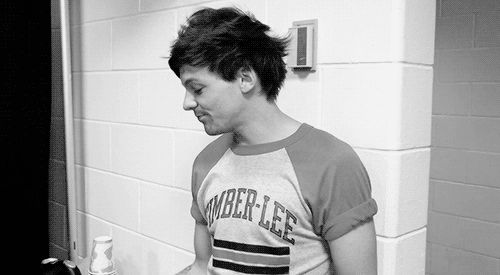
#it’s the way Maya#is 100% using a pay to publish company#to publish her HACK JOB Y/N FIC#her Mary Sue has HER INITIALS#she moved Liam’s initials by literally three letters#from LP to OS#I’m SCREAMING#she writes a fictionalized version of the first m&g#CARY is the most popular guy#LANCE is the kindest and most aware of fans#I mean!#and she says OLIVER is the LEAST POPULAR#acts like he’s older than all of them#everything is forced#I’m just GAGGED that she’s going this route#in the worst way#😱😱😱😱#also the writing is BAD#any real publisher would be paying HER to publish this#releasing direct to Amazon had me 👀👀#and then looking up the supposed publisher#like I said it’s 100% a pay to publish#and she’s paying for the literal copies of the book#paying Amazon to distribute#etc#embarassing#don’t fuck with me I work in publishing#K*itlin T**fany at least had a real publisher#and a real agent#LOL
13 notes
·
View notes
Text
Hey, Linux Community, do you have any linux distro recommendations for a window user with no coding experience? Thinking of changing as my laptop gets older and slower, and I honestly don't know where to start.
3 notes
·
View notes
Text
I don't know I'm not done talking about it. It's insane that I can't just uninstall Edge or Copilot. That websites require my phone number to sign up. That people share their contacts to find their friends on social media.
I wouldn't use an adblocker if ads were just banners on the side funding a website I enjoy using and want to support. Ads pop up invasively and fill my whole screen, I misclick and get warped away to another page just for trying to read an article or get a recipe.
Every app shouldn't be like every other app. Instagram didn't need reels and a shop. TikTok doesn't need a store. Instagram doesn't need to be connected to Facebook. I don't want my apps to do everything, I want a hub for a specific thing, and I'll go to that place accordingly.
I love discord, but so much information gets lost to it. I don't want to join to view things. I want to lurk on forums. I want to be a user who can log in and join a conversation by replying to a thread, even if that conversation was two days ago. I know discord has threads, it's not the same. I don't want to have to verify my account with a phone number. I understand safety and digital concerns, but I'm concerned about information like that with leaks everywhere, even with password managers.
I shouldn't have to pay subscriptions to use services and get locked out of old versions. My old disk copy of photoshop should work. I should want to upgrade eventually because I like photoshop and supporting the business. Adobe is a whole other can of worms here.
Streaming is so splintered across everything. Shows release so fast. Things don't get physical releases. I can't stream a movie I own digitally to friends because the share-screen blocks it, even though I own two digital copies, even though I own a physical copy.
I have an iPod, and I had to install a third party OS to easily put my music on it without having to tangle with iTunes. Spotify bricked hardware I purchased because they were unwillingly to upkeep it. They don't pay their artists. iTunes isn't even iTunes anymore and Apple struggles to upkeep it.
My TV shows me ads on the home screen. My dad lost access to eBook he purchased because they were digital and got revoked by the company distributing them. Hitman 1-3 only runs online most of the time. Flash died and is staying alive because people love it and made efforts to keep it up.
I have to click "not now" and can't click "no". I don't just get emails, they want to text me to purchase things online too. My windows start search bar searches online, not just my computer. Everything is blindly called an app now. Everything wants me to upload to the cloud. These are good tools! But why am I forced to use them! Why am I not allowed to own or control them?
No more!!!!! I love my iPod with so much storage and FLAC files. I love having all my fics on my harddrive. I love having USBs and backups. I love running scripts to gut suck stuff out of my Windows computer I don't want that spies on me. I love having forums. I love sending letters. I love neocities and webpages and webrings. I will not be scanning QR codes. Please hand me a physical menu. If I didn't need a smartphone for work I'd get a "dumb" phone so fast. I want things to have buttons. I want to use a mouse. I want replaceable batteries. I want the right to repair. I grew up online and I won't forget how it was!
49K notes
·
View notes
Text
The United States smart TV market size is projected to exhibit a growth rate (CAGR) of 2.00% during 2024-2032. The growing popularity of streaming services, the widespread adoption of smart TV in the educational sector, and the continuous evolution of technology led manufacturers to innovate, improve screen quality, enhance connectivity options, and incorporate voice recognition features into their products represent some of the key factors driving the market.
#United States Smart TV Market Report by Resolution Type (4K UHD TV#HD TV#Full HD TV#8K TV)#Screen Size (Below 32 Inches#32 to 45 Inches#46 to 55 Inches#56 to 65 Inches#Above 65 Inches)#Screen Type (Flat#Curved)#Technology (Liquid Crystal Display (LCD)#Light Emitting Diode (LED)#Organic Light Emitting Diode (OLED)#Quantum Dot Light Emitting Diode (QLED)#Platform (Android#Roku#WebOS#Tizen OS#iOS#MyHomeScreen#and Others)#Distribution Channel (Offline#Online)#Application (Residential#Commercial)#and Region 2024-2032
0 notes
Text
Honestly I don't know why people are so hellbent on staying with Windows when Linux has distributions like
AmogOS

Hannah Montana Linux

Ubuntu Satanic Edition (comes with free metal music)

UwUntu (Annoyingly a really good OS and one of the funniest too. The guys who make it recommend you anime movies every time you install a new version)


372 notes
·
View notes
Text
A "marxist-leninist video game" as I envision it would not really look like Halo but it's About The Revolution. I think a proper ML video game in my mind's eye would be an extremely low-action but mind-bogglingly thorough and complex browser/OS simulator wherein you do the day-in-day-out extremely difficult work of investigating the material bases of the conditions of this fictional world and its ludicrously nuanced lore and compiling meticulous research to justify making specific, extremely small-scale policy decisions for your local branch of the ruling communist party of the DOTP you live inside. it is rendered in beautiful pixel art but has a mode where the entire game can be run 100% text-based. you will have to contend with the data you collect being tainted by various elements including but not limited to random incompetence, foreign bourgeois propagandist interference, confusing inconsistencies, and simple individualist self-interest. the game would use remarkably advanced AI text-parsing technology to decide whether or not your reasoning and justifications for a particular policy decision were sufficiently thorough and careful and whether they had sufficiently considered the possible downstream effects of this decision on the broader society. if you make a mistake you have to do an entire sidequest branch which involves criticism and self-criticism which is again judged by the game's AI. the game would use the most bleeding-edge LLMs to do this and would be optimized to run on a Raspberry Pi 2 platform and would be distributed in little fun single-purpose consoles called Handtrons. it runs natively on Linux Mint. it would cost $0.15 and would get an Overwhelmingly Negative review on the Steam store but there would be an avid fanbase of a friend group of like 30 guys in Inner Mongolia who have meticulously and lovingly curated an independently hosted wiki for the game. amidst all of the vicious reviews on Steam of "Wtf this game is shit" and "how do u even play this" and "couldn't get past the first page(?)" there's a single glowing review, beautifully translated into 5 languages, which includes comments like "I don't believe it is right to call this a game. Rather I believe this elevates the medium of "game" into an entirely different form, and we are all bettered for it. This piece is rich in humanity and even richer in its love for the toiler. It is, down to its very core, the love of a firm older sister -- occasionally unforgiving, but only because it thinks of you so highly and expects so much; transcendentally hopeful, in how it believes in the capacity for things to be changed, if only in a small way, by the work of someone it trusts without question; kind and gentle in how it is as patient with you as you choose to be with it; and, like the only kind of love which matters, it is rooted deeply in truth. I will give this game to my children when I have them, if I am able, and it will be my greatest joy. 4.5/5 stars, only because I had difficulty running this on my android device despite there being native support (I downloaded a modded version from rutracker that fixed all the issues)."
218 notes
·
View notes
Text
Pov: You knew slashers, when you was a child (Slashers x fem!reader)
I'm back! Well, it os a lazy post from my drafts, until I end my new idea <3
TW: no
Characters: Thomas Hewitt, Brahms Heelshire, brothers Sinclair
P.S.: English is not my native language, so lot of these words was translated by simple translator, sorry for misspells and e.t.c.
Enjoy this!

Thomas Hewitt
The transition to a new school has always been a great stress for a child, especially in the middle of the school year.
You and your parents often moved from city to city. Maybe it was their work, or maybe they just wanted to show you as many different places as possible so that your childhood would remain really memorable — you didn't know. But the constant moving was followed by a change of schools and kindergartens. On the one hand, you liked it — new acquaintances, interests and a lot of positive emotions, after all, you were a cheerful and active child — but it also brought its inconveniences — you didn't have "best" friends, you had no more than a couple of months to communicate with each of them, and multiple the change of the team has made you a real chameleon in society.
You were ten years old when you and your parents moved to Texas. The age when most classes have already been divided into peculiar interest groups, which are quite difficult for a new person to join. That's why your mom decided to bake cookies that you could distribute to new classmates. Who doesn't like homemade cakes? You actively participated in the cooking process. A little more practice, and you could learn these cookies on your own. As soon as the treat was ready — several pieces were successfully taken away by your father — your mother beautifully put it in a colored box, now tied with a ribbon. The inscription "Welcome" was painted on the lid in gold paint.
It was very hot in this area of Texas. Therefore, on your first day of school, you decided to limit yourself to a beautiful white T-shirt with some simple pattern and black shorts. The first impression is the most important, right? Your mom took you to school by car. At the reception desk, your mom introduced you and found out the number of the right office. After kissing you goodbye on the cheek, she left you to your own luck. Although you were already used to it, a nervous feeling of anticipation bubbled somewhere in your chest; your palms were sweating.
After a good seven minutes, you were standing in front of the right class, 212, clutching a box of cookies to your chest. Adjusting the strap of the gray backpack, you exhaled anyway.
Your homeroom teacher, Mrs. Sullivan, introduced you in the office. A lovely woman with curly locks hanging down on both sides of her face and freckled cheeks. Her soft figure, dressed in a white blouse and a black pencil skirt, caused a surge of strength and confidence in you. The woman lightly put her arm around your shoulders, so motherly, and asked you to tell about yourself.
"My name is Y/N Y/L," your voice trembled slightly while your gaze ran over the children sitting in the classroom, "I'm ten. I like animals and beading... Mm, my parents and I move around a lot, so I don't think I'll stay here for more than two months. I hope we'll become friends."
You ended your performance with a sincere warm smile. Mrs. Sullivan asked you to take an empty seat. Your choice fell on the farthest place by the window; a guy was sitting behind it, hunched over and staring at the street. Was he weird? No, rather unusual. He had long black hair, so unusual for a boy; his gaze was lowered somewhere on the dusty road near the school, so you couldn't see his eyes. Sitting down next to him, you quickly took out a notebook and pencil from your backpack.
"Hello?"
The boy seemed startled by your voice. He looked at you uncertainly, and you saw a face wrapped in bandages. Sad cornflower blue eyes peeked out from under the white cloth.
"I'm Y/N," you whisper, holding out your hand to the boy, "And what's your name?"
There was no response. Disappointed, you lowered your hand, now paying attention to the teacher's explanation. The woman was writing down her words on the blackboard, and you quickly began copying them into your notebook, clutching a pencil until it crackled.
There was something about this boy that attracted you. It doesn't matter if it was his shyness or isolation — you decided that you definitely want to make friends with him.
At recess, you approached a group of girls. They were dressed up like girls from fashion magazines that you often saw in kiosks by the road.
"Hi," — you said with a light smile.
"Well, hello," said one of the girls, popping a bubble of gum.
"I want to ask. M, that boy," you pointed to the long—haired boy, "What's his name? I asked, and he ignored me."
"Haha, he won't answer you. That's our little Tommy," another girl hissed sarcastically, giggling, "Thomas Hewitt is weird. Very strange. I heard that his father is his brother!"
"And he's also a terrible freak!"
You awkwardly put your hand in your hair. Thomas didn't look as disgusting as the girls described him. It's all rumors. And what to take from these children, they probably didn't even try to talk to Hewitt!
You didn't talk to this company anymore. After waiting for lunch, when all the children went out to the garden at the school, you again approached the boy. He didn't budge. It seems he hasn't even written anything since you sat down next to him.
"Hey, hello?" you waved your palm in front of the guy's face, "Thomas, right?"
This time the boy paid attention to you. There was no emotion visible under the thick layer of bandages, but you were sure that he arched an eyebrow questioningly. He's wondering how you know his name?
"You were sitting alone, so I came over. Your name is Thomas, right?" you repeated the question, finally the boy nodded, "That's wonderful! I'm Y/N, let's get acquainted."
Smiling happily, you hand the guy an open box of cookies. Golden crust with chocolate chips. You had no desire to share such a delicious thing with such terrible and tactless people. And Tommy. Tommy was different. He was timid and calm, unable to cause harm.
"Help yourself," you babble, sitting down next to Hewitt, "I made them myself! Not without my mommy's help, of course..."
You blush slightly and see Thomas's eyes narrow. He smiled! He seems to be starting to like your company.
"Can I call you Tommy?"
• Thomas has become noticeably happier since you met him. The boy began to spend more time outside the house, in your company (Luda was very surprised by this, because usually after school Tommy always came home and sat in his room).
• For your birthday, Thomas himself sewed a soft toy for you, a fox, as he found out later, this is one of your favorite animals. The toy was sewn from different, but matching pieces of fabric, a little sloppy, but quite skillfully. It made you smile. You threw your arms around Hewitt for joy.
• Once you praise him, Tommy immediately blushes a lot. It's good that it's not visible under the layer of bandages. From the moment you became friends, Thomas's self-esteem has risen a little.
• When you first offered to help Thomas change the bandages, he strongly refused. The boy just couldn't let you see his face. But when he finally gave up, Hewitt was pleasantly surprised that you didn't scream and run away. You didn't call Tommy a freak or a monster, but only sympathetically stroked his scarred cheeks.
• Over time, you began to understand Thomas without words, absolutely. You found the right answers in his movements, grunting, awkward head turning or excessive gesticulation. Even Luda was a little amazed at your nonverbal communication, but the woman was glad that her son finally found a real friend.
• Tommy often showed you his drawings. It was like the scribble of a five-year-old child, but you were always happy to accept the leaves and hang them over your bed. Basically, Thomas drew his family: angry Charlie in the corner of the paper, Monty sitting next to him in a chair, a little further away, Luda was cooking, and in the center of the drawing you and Thomas holding hands and smiling.
• It was the first time you begged your parents to stay in this city longer. Fortunately, they agreed after seeing your enthusiasm for the "strange boy".

Brahms Heelshire
• Your parents and the Healers kept in touch for a while, you can say your families were very close. You first met Brahms on his fifth birthday. He was a very well-mannered but private boy, so Mrs. Heelshire was only too happy to introduce you.
• At first, your communication did not work out. Brahms was a rude child in places, took away your toys and teased you.
• His true attitude towards you showed up when you didn't come to his house, although you were visiting the Heelshire family every Monday and Wednesday. He was seriously worried. All morning Brahms sat in his room by the window and looked at the road going through the forest, waiting for your little body in your favorite blue dress to appear from behind the trees. But you were never there. It turned out that you were just sick. That day Brahms went to your house and did not leave your bed, squeezing your hot palm.
• Your parents worked most of the time, so they were not against your games with Heelshire Jr. You stayed in their house more and more often, sometimes even overnight, and you and Brahms made noise all night, forcing his mother to swear. But still, the woman was glad that at least Brahms was behaving quite comfortably and boldly with someone.
• You were only a couple of months younger than Brahms, but you thought it was a good reason to tease you.
• The boy allowed you to enter his room without knocking, consider it a worthwhile privilege, because Heelshire does not let everyone into his personal space.
• When you were sad, Brahms brought you bouquets of flowers hastily made with his own hands. That's why his palms were green most of the time.
• Brahms makes wonderful sandwiches. He often makes them when the two of you are having a "picnic" in the garden. Although in fact he agrees to it only to admire you.
• Heelshire loves sweets very much. Very. His mom doesn't allow the boy a lot of sweets and cakes, so you secretly bring them to him from home. The boy is insanely happy.
• Brahms loves kissing. This habit, or rather the need, appeared in him because you praised the boy in this way. Has he finally cleaned the room? A kiss. Did he break his mom's precious vase during the catch-up today? A kiss! So now he can demand them for any reason. He especially likes it when you kiss him before going to bed, and Brahms falls asleep hugging you.
• You're his best friend. That's why Brahms trusts you with all his secrets. You are the only one to whom he has told about the strange and frightening thoughts that sometimes sound in his head.
"Good night," Mrs. Heelshire said, turning off the light and closing the door behind her.
You smile and blow her a kiss, covering your mouth with your palm. When the woman's footsteps recede, you exhale with relief, plopping down on the pillow with force. Squinting your eyes, you wrinkle your nose, trying to blow away the stuck strands of hair from your face. Brahms giggles and gently tucks your hair behind your ear.
The room is cool. The window is slightly ajar, letting in a light autumn wind. The curtains are swaying from side to side, taking chaotic frightening shadows.
You get under the covers up to your nose. Brahms follows your example, pressing his whole body against you, and you stroke his head.
"If I ever do something very, very bad, will you stay with me?" Heelshire whispers, looking up at you.
You look into his sad emerald eyes and laugh. He likes to put pressure on your pity, because he knows that at such moments you see him as a tiny abandoned kitten.
"I don't think you'd do anything so bad, Brahms."
"But if I do. What if everyone turns away from me. Even mom and dad. Will you stay with me?"
You pressed your lips together, frowning. Brahms had never asked such strange questions before. And how can a child who is only eight years old think about something like that after a while. Looking down at the ceiling, you turned your head, looking into Brahms' eyes.
"Yes. I'll stay."
"Honestly?" Heelshire asks incredulously.
"Honestly."
"Promise?"
"Yes, I promise you, silly boy!" you abruptly cover his face with a blanket, holding the edges on both sides of his head.
The boy was kicking, trying to get out from under your weight, while you tried not to laugh. Taking pity on his futile attempts, you took off the blankets, admiring Brahms' flushed face. Heelshire was breathing heavily, and his cheeks and nose were burning like Chinese lanterns that your parents launched on your birthday.
"I won. Again," you grin.
Brahms is silent. You sigh and lie down again, turning your back to Heelshire. Your eyes are shining with joy, and your lips continue to curve in a smug grin. You know that Brahms will not dare to do something to you in return. He always let you get away with such antics. Absolutely always.
When you are ready to fall asleep, through the chatter in your head you hear a plaintive whisper. Having opened your leaden eyelids, you groan with displeasure.
"Kiss me," Brahms whines, and you get up on your elbows, chuckling softly.
"Okay," you kiss Heelshire on the lips, "Good night, Brahms."
• "Now I've won," Brahms croaks, pressing you against the wall and spreading his hands on both sides of your head. Just like a child. Except now he's not the victim here, but you. Although was he ever a victim in your games? Rather, he always played the role of a presenter, you just didn't notice it, as if you were looking through your fingers. And who would have thought that that innocent little boy would ever stand in front of you, towering over your body by a good two heads, and grinning with eyes shining in anticipation through the black slits of the mask.

Sinclairs
Christmas is the most mysterious and magical holiday of the year; the day when the whole family gathers at one big table to properly celebrate this moment together; the day when you receive a lot of gifts from all kinds of relatives, which you sometimes did not realize; the day when all wishes come true.
You clumsily shuffled along the road, shaking your back every now and then to adjust the heavy backpack. Things inside rattled a lot, and you tried to straighten your back faster to avoid crumpled packages.
Christmas was your favorite holiday. And although your parents have been working constantly lately, you were glad that you could spend this family holiday with your friends.
You met not so long ago, only about four months ago, when you first moved here. Ambrose turned out to be a very nice and cozy city with friendly and caring people. Mrs. Sinclair, Trudy, and your mom became friends right away— their interests converged on art. That's when I met her sons, the woman suggested that you make friends with them because of their similar age. And it turned out to be a very good idea. The boys quickly became addicted to you.
Once again adjusting the canvas straps of the backpack, you quickly climb the steps requested by the snow and knock on the sand-colored door several times. On the other side, there is a fussy shuffling and dissatisfied grumbling.
"Hello," you say, smiling, when the door swings open in front of you, revealing a view of the timid Vincent.
The guy nods to you and opens the door wider, motioning you to enter. You kiss Sinclair on the cheek of the mask. Brushing off your feet at the threshold, you quickly take off your shoes and leave your backpack at the shoe shelf. Music from an old radio is coming from the kitchen, some station unknown to you is playing old songs from the seventies. As soon as you entered the room, Vincent stood at the stove again, frying something in a frying pan. Whenever Trudy was busy making figures and arranging a museum that she someday wanted to open, it was Vincent who did the cooking and other household duties. Bo was stubborn and didn't want to do "women's" work, and Lester was still too young for such a large-scale activity. The latter was now sitting at the table and skillfully sliced an apple with a hunting knife into neat pieces.
"Morning, Lester," passing by the boy, you leave a small kiss on his forehead.
"Hi, Y/N!" Sinclair winces contentedly, flapping his big copper eyes.
You sit down next to the boy and imperceptibly take a piece of apple from under his nose, throwing it into his mouth contentedly. There were already several plates and cutlery on the table. Vincent loved order, so he prepared everything in advance.
"Where's Bo?" you ask, rocking slightly in your chair, for which you get a menacing look from Vincent.
"Mom asked him to help at the museum," Lester replied, "He should be back soon."
You notice how Vincent turns off the stove and turns his whole body in your direction. The guy takes a notebook lying on the table and quickly scribbles something.
"Have you had breakfast?"
"Yes," you say shortly, when Vincent closes the notebook and puts it back, "Honestly."
Sinclair puts the hot omelette on plates and pushes you a bowl of oatmeal cookies. You happily take one piece. Vincent sits down across from Lester and lifts the mask just enough to see his mouth. You frown, noticing the edge of his deep scar.
"Hey everyone," it was heard from the threshold, when the front door slammed shut with force, "Oh, honey, and you're here," Bo walks past you, lightly touching your shoulder in greeting, and sits down next to Vincent.
During brunch, you watch Lester and Bo actively negotiate. When their plates are empty, you decide to step in.
"Since everyone is here," you babble happily, clapping your hands to attract the attention of the guys, "I want to give you gifts a little earlier than planned, do you mind?"
"Of course not," Bo abruptly pushed away from the table, "I'm all for it, babe."
Bo winked at you playfully, to which you rolled your eyes. Vincent signed something, and you looked at Lester. Your sign language was not yet good enough to understand most of the phrases, you barely remembered the words of politeness. That's why you've always relied on little Lester at times like this.
"He said: "Why are you doing this so early?"", Lester explained, innocently blinking his eyes.
"What's the difference," Bo frowned, "Sooner or later — the main thing is that she gave."
You didn't comment on the elder Sinclair's words, but just got up from the table and went to your backpack resting in the hallway. When you came back, the brothers were already sitting in a kind of semicircle on the floor. Bo sprawled impressively closer to the sofa and grinned in anticipation; Lester, in his usual manner, sat cross-legged; while Vincent tucked his knees to his chest.
You sat down between the twins and put the backpack next to you, unzipping it. You said "Close your eyes" and, as soon as the boys fulfilled your request, you began to take out colorful boxes. All packages had the same color, different sizes. Alternately, you put the gifts in front of them and allowed them to watch. Lester giggled when he saw that his box was the biggest.
"Merry Christmas," you drawled, spreading your arms out to the sides.
The very first gift was opened by Lester. The boy happily tore open the package, scattering the paper around him, and screamed when he saw the cherished surprise. A big stuffed fawn. He had a soft beige body and neat brown horns sticking out in different directions. The muzzle was cheerful, with a big nose and shiny button eyes.
"I knitted it especially for you," you babble, smiling, when Lester looks up at you with an enthusiastic look.
"Thank you!" the boy throws himself on your neck with lightning speed, squeezing your body until the bones crunch; you stroke his back.
Bo was a little surprised when he saw a set of tools under the wrapper. He loved tinkering and was well versed in mechanics; the fact that you remembered about this hobby touched the guy a little; his lips curved in a slight smile.
"Well, thanks, babe," Bo grins, patting your hair.
You're pouting a little. All the time spent in the morning combing this tangled nest has gone to waste. You are dissatisfied with blowing off a few strands that caught your eye.
The last person to open his gift was Vincent. The boy very tenderly unwrapped the package, not trying to tear it, as if stretching and savoring this moment. You watched the deft but careful movements of his fingers with burning impatience. Finally, Sinclair took off all the paper, removing it from the side, and looked down at what he saw. A large set with colored pencils. Exactly the one that the boy looked at with undisguised envy in the window of an art store about a month ago. Did you remember that? With slightly trembling hands, Vincent takes the box and turns it in his hands. There were several more drawing pads under it.
Vincent looks at you, and you see the trembling gaze of his azure eyes in the slits of the mask. Such unbelievers, but at the same time grateful. You crawl up to the boy and hug him tightly, nuzzling his neck. Vincent lets out a ragged sigh.
"Merry Christmas to you, boys," you congratulate them once again, seeing the boys' satisfied smiles.
"So why did you decide to give it to us so early?" Lester asked, clutching the toy to his chest.
"Oh, that," you awkwardly fix your hair, "Well, my parents decided to leave. To another state. We'll leave tonight. So I thought I could have some fun with you now."
There was an oppressive silence in the room. You were afraid to look up, but you could feel the disappointment on the boys' faces. Your heart was painfully squeezed in your chest, from which you gritted your teeth with a creak.
"Will you come back?" Bo broke the silence.
"I don't know. Dad was offered a job in another state. Mom just said I wouldn't be able to see you."
You looked at each of the boys in turn. Vincent's head drooped, Bo's brows furrowed, and Lester's lips tightened into a crooked thread. The elder Sinclair sighed heavily.
"We'll be waiting. All together," he looked at you from under his brows, "Just try not to come back to us."
• Vincent loves sweets; but, often, Bo takes most of the goodies. That's why you put an envelope with several edible bracelets in one of the donated notebooks. Bo will probably consider them girly and will not take them away from his brother.
• You have been knitting a fawn for Lester for about five days; the boy is very happy with your gift. Your relationship is like a brother and a scary sister. He is always ready to rely on you; Sinclair is glad that he has such a caring person, unlike the same brothers (in particular Bo).
• Trudy adores you. You could say that in these few months she began to perceive you as her own daughter. You even know where the spare keys to the back door of the house are.
• Bo always tries to impress you as a self-sufficient high school student. He saw his father's old magazines with tackles, seduction and other materials not for children, so he decided to train on you. He didn't notice how he fell in love.
• Vincent is a good cook.
• Most of Vinnie's drawings in the new notebooks are you. He will paint your portraits for many years after your leaving.
#slashers x reader#thomas hewitt#thomas hewitt x reader#brahms heelshire#brahms heelsire x reader#lester sinclair#lester sinclair x reader#vincent sinclair#vincent sinclair x reader#bo sinclair x reader#bo sinclair
3K notes
·
View notes
Text
new york state!! what!!
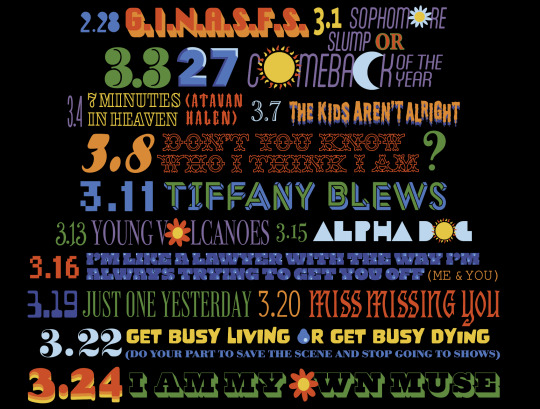
(will start a new post for the last 9 shows!! gonna link it here after wednesday)
welcome to my new ongoing graphic design project post because the old post was getting a little bit long! i am recreating this t shirt design:

with the 8 ball songs instead of the city names! here is the most recent iteration, updated through 3/15 (orlando):
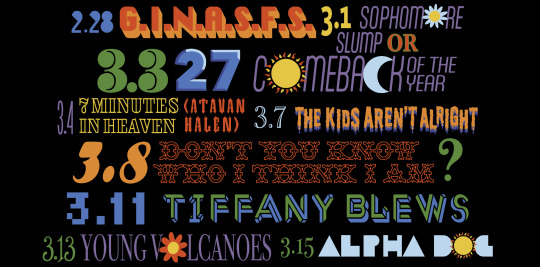
#bees' graphic design adventure#welp#i don't. love the way this looks.#but i still haven't been able to fit the moon from raleigh in the original so i moved up the flower from columbus#so if there's an opportunity it won;t be too crowded down there#how do we feel about this. i don't. hmmm#i don't like the 3.22 and 3.24 rows being so row-like#once it's done maybe i'll fuck around with the spacing. idk#it feels not good#i think bc i'm really trying to keep the dimensiuons of the letters in albany the same#so bc the song title is longer than the city the row height isn;t the same#i guess i can just. make the row shorter. wait. i'm gonna go do that. you'll see it on wednesday tho im tired#edit hey i changed it. yall will see it wednesday but i made albany shorter and changed some of the symbols#so now the c in volcanoes is the moon from raleigh and the flower that was there is now in don't you know/austin#i think it works#idk#i'm trying to keep the distribution of symbols throughout relatively the same#difficult when the letters are not in. the same places#and i can only use cs and os
195 notes
·
View notes
Text
the op of that "you should restart your computer every few days" post blocked me so i'm going to perform the full hater move of writing my own post to explain why he's wrong
why should you listen to me: took operating system design and a "how to go from transistors to a pipelined CPU" class in college, i have several servers (one physical, four virtual) that i maintain, i use nixos which is the linux distribution for people who are even bigger fucking nerds about computers than the typical linux user. i also ran this past the other people i know that are similarly tech competent and they also agreed OP is wrong (haven't run this post by them but nothing i say here is controversial).
anyway the tl;dr here is:
you don't need to shut down or restart your computer unless something is wrong or you need to install updates
i think this misconception that restarting is necessary comes from the fact that restarting often fixes problems, and so people think that the problems are because of the not restarting. this is, generally, not true. in most cases there's some specific program (or part of the operating system) that's gotten into a bad state, and restarting that one program would fix it. but restarting is easier since you don't have to identify specifically what's gone wrong. the most common problem i can think of that wouldn't fall under this category is your graphics card drivers fucking up; that's not something you can easily reinitialize without restarting the entire OS.
this isn't saying that restarting is a bad step; if you don't want to bother trying to figure out the problem, it's not a bad first go. personally, if something goes wrong i like to try to solve it without a restart, but i also know way, way more about computers than most people.
as more evidence to point to this, i would point out that servers are typically not restarted unless there's a specific need. this is not because they run special operating systems or have special parts; people can and do run servers using commodity consumer hardware, and while linux is much more common in the server world, it doesn't have any special features to make it more capable of long operation. my server with the longest uptime is 9 months, and i'd have one with even more uptime than that if i hadn't fucked it up so bad two months ago i had to restore from a full disk backup. the laptop i'm typing this on has about a month of uptime (including time spent in sleep mode). i've had servers with uptimes measuring in years.
there's also a lot of people that think that the parts being at an elevated temperature just from running is harmful. this is also, in general, not true. i'd be worried about running it at 100% full blast CPU/GPU for months on end, but nobody reading this post is doing that.
the other reason i see a lot is energy use. the typical energy use of a computer not doing anything is like... 20-30 watts. this is about two or three lightbulbs worth. that's not nothing, but it's not a lot to be concerned over. in terms of monetary cost, that's maybe $10 on your power bill. if it's in sleep mode it's even less, and if it's in full-blown hibernation mode it's literally zero.
there are also people in the replies to that post giving reasons. all of them are false.
temporary files generally don't use enough disk space to be worth worrying about
programs that leak memory return it all to the OS when they're closed, so it's enough to just close the program itself. and the OS generally doesn't leak memory.
'clearing your RAM' is not a thing you need to do. neither is resetting your registry values.
your computer can absolutely use disk space from deleted files without a restart. i've taken a server that was almost completely full, deleted a bunch of unnecessary files, and it continued fine without a restart.
1K notes
·
View notes
Text
The paradox of choice screens
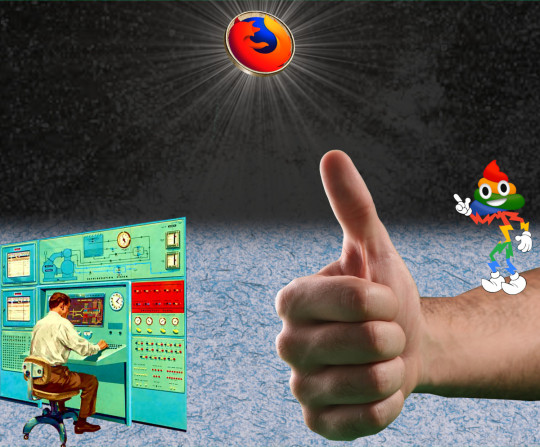
I'm coming to BURNING MAN! On TUESDAY (Aug 27) at 1PM, I'm giving a talk called "DISENSHITTIFY OR DIE!" at PALENQUE NORTE (7&E). On WEDNESDAY (Aug 28) at NOON, I'm doing a "Talking Caterpillar" Q&A at LIMINAL LABS (830&C).

It's official: the DOJ has won its case, and Google is a convicted monopolist. Over the next six months, we're gonna move into the "remedy" phase, where we figure out what the court is going to order Google to do to address its illegal monopoly power:
https://pluralistic.net/2024/08/07/revealed-preferences/#extinguish-v-improve
That's just the beginning, of course. Even if the court orders some big, muscular remedies, we can expect Google to appeal (they've already said they would) and that could drag out the case for years. But that can be a feature, not a bug: a years-long appeal will see Google on its very best behavior, with massive, attendant culture changes inside the company. A Google that's fighting for its life in the appeals court isn't going to be the kind of company that promotes a guy whose strategy for increasing revenue is to make Google Search deliberately worse, so that you will have to do more searches (and see more ads) to get the info you're seeking:
https://pluralistic.net/2024/04/24/naming-names/#prabhakar-raghavan
It's hard to overstate how much good stuff can emerge from a company that's mired itself in antitrust hell with extended appeals. In 1982, IBM wriggled off the antitrust hook after a 12-year fight that completely transformed the company's approach to business. After more than a decade of being micromanaged by lawyers who wanted to be sure that the company didn't screw up its appeal and anger antitrust enforcers, IBM's executives were totally transformed. When the company made its first PC, it decided to use commodity components (meaning anyone could build a similar PC by buying the same parts), and to buy its OS from an outside vendor called Micros-Soft (meaning competing PCs could use the same OS), and it turned a blind eye to the company that cloned the PC ROM, enabling companies like Dell, Compaq and Gateway to enter the market with "PC clones" that cost less and did more than the official IBM PC:
https://www.eff.org/deeplinks/2019/08/ibm-pc-compatible-how-adversarial-interoperability-saved-pcs-monopolization
The big question, of course, is whether the court will order Google to break up, say, by selling off Android, its ad-tech stack, and Chrome. That's a question I'll address on another day. For today, I want to think about how to de-monopolize browsers, the key portal to the internet. The world has two extremely dominant browsers, Safari and Chrome, and each of them are owned by an operating system vendor that pre-installs their own browser on their devices and pre-selects them as the default.
Defaults matter. That's a huge part of Judge Mehta's finding in the Google case, where the court saw evidence from Google's own internal research suggesting that people rarely change defaults, meaning that whatever the gadget does out of the box it will likely do forever. This puts a lie to Google's longstanding defense of its monopoly power: "choice is just a click away." Sure, it's just a click away – a click, you're pretty sure no one is ever going to make.
This means that any remedy to Google's browser dominance is going to involve a lot of wrangling about defaults. That's not a new wrangle, either. For many years, regulators and tech companies have tinkered with "choice screens" that were nominally designed to encourage users to try out different browsers and brake the inertia of the big two browsers that came bundled with OSes.
These choice screens have a mixed record. Google's 2019 Android setup choice screen for the European Mobile Application Distribution Agreement somehow managed to result in the vast majority of users sticking with Chrome. Microsoft had a similar experience in 2010 with BrowserChoice.eu, its response to the EU's 2000s-era antitrust action:
https://en.wikipedia.org/wiki/BrowserChoice.eu
Does this mean that choice screens don't work? Maybe. The idea of choice screens comes to us from the "choice architecture" world of "nudging," a technocratic pseudoscience that grew to prominence by offering the promise that regulators could make big changes without having to do any real regulating:
https://verfassungsblog.de/nudging-after-the-replication-crisis/
Nudge research is mired in the "replication crisis" (where foundational research findings turn out to be nonreplicable, due to bad research methodology, sloppy analysis, etc) and nudge researchers keep getting caught committing academic fraud:
https://www.ft.com/content/846cc7a5-12ee-4a44-830e-11ad00f224f9
When the first nudgers were caught committing fraud, more than a decade ago, they were assumed to be outliers in an otherwise honest and exciting field:
https://www.npr.org/2016/10/01/496093672/power-poses-co-author-i-do-not-believe-the-effects-are-real
Today, it's hard to find much to salvage from the field. To the extent the field is taken seriously today, it's often due to its critics repeating the claims of its boosters, a process Lee Vinsel calls "criti-hype":
https://sts-news.medium.com/youre-doing-it-wrong-notes-on-criticism-and-technology-hype-18b08b4307e5
For example, the term "dark patterns" lumps together really sneaky tactics with blunt acts of fraud. When you click an "opt out of cookies" button and get a screen that says "Success!" but which has a tiny little "confirm" button on it that you have to click to actually opt out, that's not a "dark pattern," it's just a scam:
https://pluralistic.net/2022/03/27/beware-of-the-leopard/#relentless
By ascribing widespread negative effects to subtle psychological manipulation ("dark patterns") rather than obvious and blatant fraud, we inadvertently elevate "nudging" to a real science, rather than a cult led by scammy fake scientists.
All this raises some empirical questions about choice screens: do they work (in the sense of getting people to break away from defaults), and if so, what's the best way to make them work?
This is an area with a pretty good literature, as it turns out, thanks in part due to some natural experiments, like when Russia forced Google to offer choice screens for Android in 2017, but didn't let Google design that screen. The Russian policy produced a significant switch away from Google's own apps to Russian versions, primarily made by Yandex:
https://cepr.org/publications/dp17779
In 2023, Mozilla Research published a detailed study in which 12,000 people from Germany, Spain and Poland set up simulated mobile and desktop devices with different kinds of choice screens, a project spurred on by the EU's Digital Markets Act, which is going to mandate choice screens starting this year:
https://research.mozilla.org/browser-competition/choicescreen/
I'm spending this week reviewing choice screen literature, and I've just read the Mozilla paper, which I found very interesting, albeit limited. The biggest limitation is that the researchers are getting users to simulate setting up a new device and then asking them how satisfied they are with the experience. That's certainly a question worth researching, but a far more important question is "How do users feel about the setup choices they made later, after living with them on the devices they use every day?" Unfortunately, that's a much more expensive and difficult question to answer, and beyond the scope of this paper.
With that limitation in mind, I'm going to break down the paper's findings here and draw some conclusions about what we should be looking for in any kind of choice screen remedy that comes out of the DOJ antitrust victory over Google.
The first thing note is that people report liking choice screens. When users get to choose their browsers, they expect to be happy with that choice; by contrast, users are skeptical that they'll like the default browser the vendor chose for them. Users don't consider choice screens to be burdensome, and adding a choice screen doesn't appreciably increase setup time.
There are some nuances to this. Users like choice screens during device setup but they don't like choice screens that pop up the first time they use a browser. That makes total sense: "choosing a browser" is colorably part of the "setting up your gadget" task. By contrast, the first time you open a browser on a new device, it's probably to get something else done (e.g. look up how to install a piece of software you used on your old device) and being interrupted with a choice screen at that moment is an unwelcome interruption. This is the psychology behind those obnoxious cookie-consent pop-ups that website bombard you with when you first visit them: you've clicked to that website because you need something it has, and being stuck with a privacy opt-out screen at that moment is predictably frustrating (which is why companies do it, and also why the DMA is going to punish companies that do).
The researchers experimented with different kinds of choice screens, varying the number of browsers on offer and the amount of information given on each. Again, users report that they prefer more choices and more information, and indeed, more choice and more info is correlated with choosing indie, non-default browsers, but this effect size is small (<10%), and no matter what kind of choice screen users get, most of them come away from the experience without absorbing any knowledge about indie browsers.
The order in which browsers are presented has a much larger effect than how many browsers or how much detail is present. People say they want lots of choices, but they usually choose one of the first four options. That said, users who get choice screens say it changes which browser they'd choose as a default.
Some of these contradictions appear to stem from users' fuzziness on what "default browser" means. For an OS vendor, "default browser" is the browser that pops up when you click a link in an email or social media. For most users, "default browser" means "the browser pinned to my home screen."
Where does all this leave us? I think it cashes out to this: choice screens will probably make a appreciable, but not massive, difference in browser dominance. They're cheap to implement, have no major downsides, and are easy to monitor. Choice screens might be needed to address Chrome's dominance even if the court orders Google to break off Chrome and stand it up as a separate business (we don't want any browser monopolies, even if they're not owned by a search monopolist!). So yeah, we should probably make a lot of noise to the effect that the court should order a choice screen, as part of a remedy.
That choice screen should be presented during device setup, with the choices presented in random order – with this caveat: Chrome should never appear in the top four choices.
All of that would help address the browser duopoly, even if it doesn't solve it. I would love to see more market-share for Firefox, which is the browser I've used every day for more than a decade, on my laptop and my phone. Of course, Mozilla has a role to play here. The company says it's going to refocus on browser quality, at the expense of the various side-hustles it's tried, which have ranged from uninteresting to catastrophically flawed:
https://www.fastcompany.com/91167564/mozilla-wants-you-to-love-firefox-again
For example, there was the tool to automatically remove your information from scummy data brokers, that they outsourced to a scummy data-broker:
https://www.theverge.com/2024/3/22/24109116/mozilla-ends-onerep-data-removal-partnership
And there's the "Privacy Preserving Attribution" tracking system that helps advertisers target you with surveillance advertising (in a way that's less invasive than existing techniques). Mozilla rolled this into Firefox on an opt out basis, and made opting out absurdly complicated, suggesting that it knew that it was imposing something on its users that they wouldn't freely choose:
https://blog.privacyguides.org/2024/07/14/mozilla-disappoints-us-yet-again-2/
They've been committing these kinds of unforced errors for more than a decade, seeking some kind of balance between monopolistic web companies and its users' desire to have a browser that protects them from invasive and unfair practices:
https://www.theguardian.com/technology/2014/may/14/firefox-closed-source-drm-video-browser-cory-doctorow
These compromises represent the fallacy that Mozilla's future depends on keeping bullying entertainment companies and Big Tech happy, so it can go on serving its users. At the same time, these compromises have alienated Mozilla's core users, the technical people who were its fiercest evangelists. Those core users are the authority on technical questions for the normies in their life, and they know exactly how cursed it is for Moz to be making these awful compromises.
Moz has hemorrhaged users over the past decade, meaning they have even less leverage over the corporations demanding that they make more compromises. This sets up a doom loop: make a bad compromise, lose users, become more vulnerable to demands for even worse compromises. "This capitulation puts us in a great position to make a stand in some hypothetical future where we don't instantly capitulate again" is a pretty unconvincing proposition.
After the past decade's heartbreaks, seeing Moz under new leadership makes me cautiously hopeful. Like I say, I am dependent on Firefox and want an independent, principled browser vendor that sees their role as producing a "user agent" that is faithful to its users' interests above all else:
https://pluralistic.net/2024/05/07/treacherous-computing/#rewilding-the-internet
Of course, Moz depends on Google's payment for default search placement for 90% of its revenue. If Google can't pay for this in the future, the org is going to have to find another source of revenue. Perhaps that will be the EU, or foundations, or users. In any of these cases, the org will find it much easier to raise funds if it is standing up for its users – not compromising on their interests.

Community voting for SXSW is live! If you wanna hear RIDA QADRI and me talk about how GIG WORKERS can DISENSHITTIFY their jobs with INTEROPERABILITY, VOTE FOR THIS ONE!

If you'd like an essay-formatted version of this post to read or share, here's a link to it on pluralistic.net, my surveillance-free, ad-free, tracker-free blog:
https://pluralistic.net/2024/08/12/defaults-matter/#make-up-your-mind-already

Image: ICMA Photos (modified) https://www.flickr.com/photos/icma/3635981474/
CC BY-SA 2.0 https://creativecommons.org/licenses/by-sa/2.0/
#pluralistic#choice screens#dma#eu#scholarship#ux#behavioral economics#mozilla#remedies#browsers#mobile#defaults matter#google#doj v google
204 notes
·
View notes
Text
me when companies try to force you to use their proprietary software
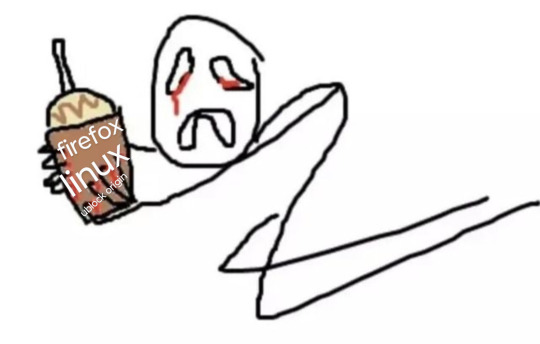
anyway
Layperson resources:
firefox is an open source browser by Mozilla that makes privacy and software independence much easier. it is very easy to transfer all your chrome data to Firefox
ublock origin is The highest quality adblock atm. it is a free browser extension, and though last i checked it is available on Chrome google is trying very hard to crack down on its use
Thunderbird mail is an open source email client also by mozilla and shares many of the same advantages as firefox (it has some other cool features as well)
libreOffice is an open source office suite similar to microsoft office or Google Suite, simple enough
Risky:
VPNs (virtual private networks) essentially do a number of things, but most commonly they are used to prevent people from tracking your IP address. i would suggest doing more research. i use proton vpn, as it has a decent free version, and the paid version is powerful
note: some applications, websites, and other entities do not tolerate the use of VPNs. you may not be able to access certain secure sites while using a VPN, and logging into your personal account with some services while using a vpn *may* get you PERMANENTLY BLACKLISTED from the service on that account, ymmv
IF YOU HAVE A DECENT VPN, ANTIVIRUS, AND ADBLOCK, you can start learning about piracy, though i will not be providing any resources, as Loose Lips Sink Ships. if you want to be very safe, start with streaming sites and never download any files, though you Can learn how to discern between safe, unsafe, and risky content.
note: DO NOT SHARE LINKS TO OR NAMES OF PIRACY SITES IN PUBLIC PLACES, ESPECIALLY SOCAL MEDIA
the only time you should share these things are either in person or in (preferably peer-to-peer encrypted) PRIVATE messages
when pirated media becomes well-known and circulated on the wider, public internet, it gets taken down, because it is illegal to distribute pirated media and software
if you need an antivirus i like bitdefender. it has a free version, and is very good, though if youre using windows, windows defender is also very good and it comes with the OS
Advanced:
linux is great if you REALLY know what you're doing. you have to know a decent amount of computer science and be comfortable using the Terminal/Command Prompt to get/use linux. "Linux" refers to a large array of related open source Operating Systems. do research and pick one that suits your needs. im still experimenting with various dispos, but im leaning towards either Ubuntu Cinnamon or Debian.
#capitalism#open source#firefox#thunderbird#mozilla#ublock origin#libreoffice#vpn#antivirus#piracy#linux
579 notes
·
View notes
Note
If Firefox is ~so good~ then why does it eat half my CPU when all I have installed is an adblocker everyone says to install (Ublock or Adblock Plus) and run like shit
IDK if it's taking half your CPU maybe your OS is bad at distributing resources and you should try running linux.
Okay that was the shitty/snarky answer because anon's bad attitude warranted it.
Real answers:
Possibly your computer really does need an upgrade of some kind; Firefox works great on my computer with an i5-11th gen processor and 20GB of RAM, but it (and let's be real probably everything else) is going to run like shit on a computer with a Core 2 Duo and 4GB of RAM. If your computer is old or underpowered and *everything* is slow, legitimately installing a lightweight linux distro might seriously improve your computing experience. And if you're attempting to run any Windows or Mac OS released in the last 5 years 8GB is going to be the absolute minimum RAM you need to comfortably use the internet, so if you're using a 10-year old computer with 4GB in it, consider adding RAM.
It depends on what you're doing. If you look at comparisons of various browsers some have better performance in some tests than in others, and there's no 100% consensus on what is the fastest. Besides, the people yelling about firefox tend to be yelling about privacy and tracking MUCH more than they are yelling about performance, but you're the only one who can determine whether privacy or performance matters more to you. However, be aware that there's no clear winner between the two in terms of speed. Every other review you click on will have a different answer and different outcomes on speed tests, which indicates that their performance is probably pretty similar (notably, Edge can be faster than both, but you probably don't want to use Edge, right? Like does it actually matter if it's faster if it's not customizable and force-feeds you ads while sending data to Microsoft?).
Your performance might be significantly improved with an extension. Plenty of people complain that if it only works with extensions that it doesn't actually work, but those people are ignoring the fact that people like having control over their internet experience. You brought up Adblock Plus and Ublock Origin - I have a very strong preference for Ublock Origin over Adblock Plus and if Adblock Plus came with a browser but prevented me from using Ublock Origin I wouldn't want to use that browser. So I think that having and testing a variety of extensions to find what works for you is probably the best way of approaching any browser. If Firefox is eating all your CPU (weird; that is not the resource it tends to consume) or RAM (which is the resource it tends to consume) I'd say to try either OneTab, which saves your tabs as a list so you don't have ton of tabs open consuming resources, or try Auto Tab Discard, which sleeps tabs on a schedule that you set and makes exceptions for active media or unfilled forms as you choose.
You might have a bad install - it happens! Sometimes things are fucky and you're having problems and uninstalling then reinstalling the browser will fix it.
But Firefox works, and works well, for millions of people. It's really odd to decide that all of those people are making shit up (for some reason) and that firefox is bad actually instead of doing some troubleshooting with your environment to figure out what's going on - especially when there are *so many* resources out there to help you figure out where the problem might be.
1K notes
·
View notes
Text
Hello everyone. Climate change and lack of infrastructure has cause severe floods in the south of brazil and thousands of people are displaced or missing. If you can help, please do, especially those who use dollar or euro. You don't know far your money can take us

This tweet has a video showing how absurdly fast the water rose. Image if this was your home, completely taken by water in under three minutes. Imagine if you had children, elderly, disabled people living here. What would you do in this situation? What can you even do?
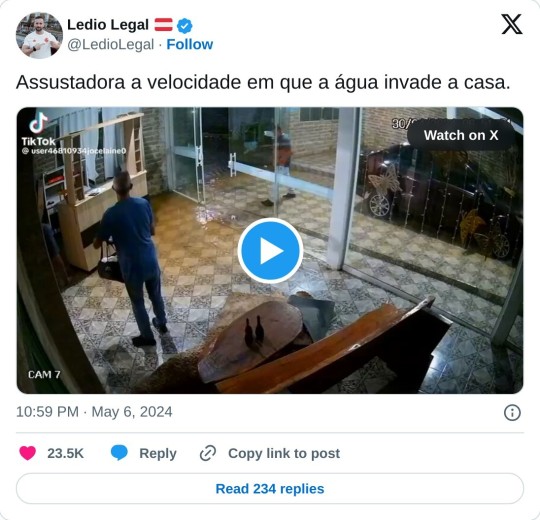
Most of the state is now underwater, and the parts that aren't don’t have power or water. Getting prescription meds and other necessities like hygiene kits and food is difficult because capitalism sucks. The military police are protecting supermarkets because the people are hungry and taking the food. Mind you, the food will spoil anyway. But god forbid people don't go hungry.
And in the midst of this chaos, public transport still isn't free. People are charging to rescue folks. So people can only be rescued by helicopter because of the currents. There are people debating whether or not they should leave pets to die.
And the government has done basically nothing. It is the government's fault, everyone knows this. The money that was supposed to go to preventing something like this simply doesn't exist. The people organizing rescues are distributing resources are the people themselves. Influencers have been doing more to the cause than the government at this point.
Some people were bringing up Madonna because the flood hit the night of her show, and they were saying the money she received should have gone to the affected people. And so she donated 10 MILLION reais. It is utter madness. There are bodies floating in the water people have to wade through.
If you can do something to help, please do
Here's a link to donate to an ngo that is feeding the displaced people

Paypal: [email protected]
Edit: Floods are also displacing people in the northeast, literally on the other side of the country. The situation is dire. Remember, you are closer to being a climate refugee than being a billionaire. If I find where you make international donations to help Maranhão I'll share it here
#brazil#rio grande do sul#climate change#global south#flood#enchentes#charity#ngo donation#climate refugees#brasil
231 notes
·
View notes
Text
#Ubuntu#Debian#Fedora#Arch Linux#Linux Mint#openSUSE#Manjaro#CentOS#Elementary OS#Zorin OS#Pop!_OS#Linux#Encuesta#Survey
66 notes
·
View notes
Text
2024 Book Review #34 – Children of Memory by Adrian Tchaikovsky
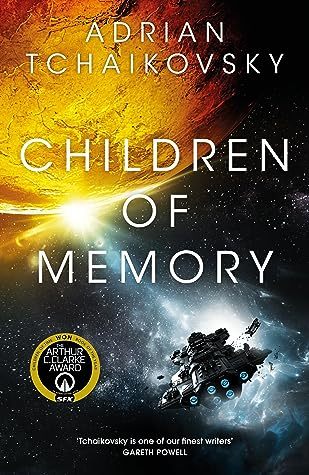
Overview
I have had this on my list for long enough for my request that the local library get a copy actually result in me getting my hands on it. It’s the third instalment (the last? I’m not sure – the ending here felt like far less of a natural conclusion than the ending to either of the previous two) of what is for my money some of the absolute best space opera (maybe even just science fiction writ large) of the last decade. I actually opened it with a real sense of trepidation; Children of Ruin had ended on an optimistic, open-ended note, with the creation of an interstellar and inter species society that was both deeply aspirational and incredibly alien. I wasn’t sure how a book from their perspective would even work. Thankfully, my fears were basically misplaced – there’s definitely a drift in tone and focus from where the series started, but the thematic heart’s still there, and this was overall a joy to read.
Synopsis
Following the end of Children of Ruin, we have a nomadic society of uplifted spiders and squids, Humans (the capitalization signifies infection by an engineered retrovirus to help with empathy and accepting/valuing the Other), the formerly all-consuming alien microbal parasites of Nod (who have agreed to only assimilate the identities of those who expressly consent to the process), and various instances of Avranda Kern (millennia old upload of a meglomaniacal mad scientist who is by a quirk of history now the OS all computers run on). After making tentative Second Contact with a half-terraformed world now inhabited by a civilization of debatably-sentient crows, an exploration ship takes on a pair of them as ambassadors before finding their way to way what seems to be a struggling but holding on colony founded by one of the last arkships of refugees to escape the ruins of Old Earth. .
Intercut with this is the narrative of that arkship arriving, very much the worse for wear after two thousand years and change hurtling through the void with its crew and cargo in cryo. The world is hardly what they hoped for – only ever half-terraformed, breathable atmosphere and some basic engineered microbal life, but entirely lacking any sort of biosphere – but it’s not like they have another option. They make the best of it they can, using what working technology they have to bootstrap a basic ecosystem of pigs and trees, a few species of bugs and fungi, enough to farm and build with. And the core crew holds out hope that the faint trace of a strange signal buried in the hills near their colony might lead to something more.
Intercut with that is the story of Liff, a young girl in the colony as things take a turn for the worse. That’s when things start to get weird.
Xenophilia
The best way for me to get across the central theme of this whole series is ‘more star trek than star trek’ (or at least, than any star trek produced since I’ve come of age). It believes is absolutely nothing so strongly as it believes in the pure and perfect virtue of curiosity, that the point of existence is to discover, and to share what you have discovered with those around you. It is an oft-repeated point that the overwhelming majority of the universe is cold and empty, and anything different is worth seeking out and treasuring for its own sake – that every shred of diversity is the cosmos is a wonder in its own right.
Which is the entire purpose our protagonist’s civilization has set themselves – the distributed fleet of pathological scientists and novelty-seekers, leaving behind teeming cities and orbital habitats for a life seeking the mysteries of the universe with tiny circles of peers. It’s very Starfleet, in its most idealistic and elevator-pitch form.
And even beyond them, curiosity, discovery and exploration are treated as basically heroic wherever they’re found – Captain Holt and the Enkidu might have been doomed, but they’re still presented as deeply and wholly admirable for trying.
It goes beyond that, too. This is one of vanishingly few space opera settings I can think of with a cast full of distinct and dissimilar species, where none of them are orcs. Or dragons, for that matter. No matter how monstrous and horrifying a species seems – spiders the size of your head, the mad remnant of an ancient demiurge, all-consuming and replicating alien parasites – the answer is diplomacy, outreach, communication. Both sequels in the series have begun with a civilization formed through the total (though not seamless) integration of alien societies from the last book into a greater whole. The parasites from Children of Ruin best exemplify this, I think – convinced that consuming and assimilating everything it can reach will result in nothing but a universe of itself, compared to walking through the world with a soft touch and appreciating all the different dynamics that can develop through so many myriad perspectives. And now one of them is basically the book’s main protagonist (and very guilty about all the nonconsensually-eating-people thing).
Whereas in Memory it’s not exactly subtle that the intolerance and violence against social deviants is presented as basically a symptom of material scarcity and desperation. When Landfall is doing well, the little band of infiltrators – strange, nonverbal artist, discomfortingly informative schoolteacher, standoffish and thoroughly gender nonconforming woodswoman – are affectionately tolerated and appreciated for what they can do. When the harvests are bad and the forests are rotting – well who even needs abstract art or history lessons to begin with? They’re lashed out at, used as just one of a growing set of scapegoats, and when things are dire enough, again and again, they end up on the noose. Intolerance is a self-harming reflex, a wounded animal lashing out because it can neither understand nor change the actual source of its pain. Again, Star Trek but moreso.
The ‘moreso’ does a lot of work in this comparison, to be fair. The series shares Star Trek’s deep love of science just like it shares its pathological liberalism – it’s just consistent about it. The crew explorers are casually transhuman (transarachnid, transcephlopod, etc) - immortal and physically enhanced, capable of sharing and downloading both memories and skills, visibly aging or carrying scars only as a fashion statement. It is treated as a casual fact of life that letting an experiment progress might mean going into cold sleep for decades or centuries, if there is no better way for a group of six on a small ship to while away the time while they wait. Technology has conquered scarcity on anything like a personal scale, and the explorers take full advantage.
Which is probably downstream of the books not being particularly caught up on ‘humanity’. I mean, humans are there – are very important! - but to the extent they’re the axis the universe turns upon, it’s only the ghosts of the old empire. Modern humans are just one part of interstellar civilization, and not even its most numerous or prominent. Humans have a unique way of thinking (as does everyone else) but no monopoly on heroic drive or virtue.
Curious Corvids
Each book in the series feels marketed around a different uplifted animal arising from the ruins of humanity’s imperial glory and galaxy-spanning hubris. This is not wrong, but it definitely becomes less right as the series progresses.
Children of Time is about the spiders. There’s humans too, sure, but I’ve yet to see a single person who read for the Gilgamesh plotline. By wordcount and thematic focus and just what makes it an interesting book, it is about the evolution of Portid intelligence and civilization across the millennia. The real protagonist of the novel is the species.
Children of Ruin is still kind of about the uplifting of the Squids. Senkovi’s efforts and relationship with them gets a decent amount of focus, as does the development of their civilization after the terraformers’ death. They just share top billing with the alien aliens, and rather than just being the climax of the story Second Contact is the real meat of the entire plot.
In Children of Ruin the introduction of the corvids almost feels like a publisher mandate – their history and backstory is basically brushed over in the prologue and one interlude, Second Contact basically a triviality. It’s not that they’re not important to the book or its themes, or that they’re not interesting (in both cases they very much are!), but they feel like a b-plot. Supporting what the book is about, not defining it.
Which to be clear, is from a writing perspective almost certainly the correct choice – ‘Children of Time but with a different species’ would still be fascinating, but it really doesn’t cohere as a continuing and linked series. I just think you could have dug some more meat out of the abbreviated history given there. What fanfic is for, I suppose.
It’s a funny sort of distinction that unlike the others, the corvids aren’t technically uplifts – the considered opinion of the series is that while spiders and squids would require millenia of nanite-assisted directed evolution to develop anything that looks like human-level sapience, in the right environment crows would just Do That (admittedly with the addition of alien radiation scrambling DNA and increasing mutation rate by an order of magnitude or two).
The other trend with the different uplift species as the series has gone on is that with each book they become neurologically and psychologically weird. The spiders had Understandings and a bunch of predator- and cannibal-instincts, but they’re still each an individual intelligence. The squids are a central brain and a bunch of semi-autonomous limbs which are only barely on speaking terms with the conscious mind. And now the crows are not individually intelligent at all – they think and live in pairs, one observing and recalling, the other analyzing and inferring, actual intelligence appearing only in the dialogue and interaction between the two. Which makes chapters from their POV very entertaining, at least.
Sentience and Identity
The book’s very interested in both – it’s probably the most central and explicit theme of the entire thing. Our crows, having given the matter thorough and careful reflection, eventually decided that they weren’t sentient at all (that nothing is, really) – or at least, that’s the series of sounds they make when asked. Our other main characters include:
an alien parasite which has assimilated a copy of a woman’s consciousness and now imitates her so well she often forgets she’s anything else
a copy of a sliver of an instance of an upload of an ancient terraformer, who for a nontrivial period of time was running on hard that was mostly ant colony
an extremely detailed simulation of someone who could have but never did exist
(arguably) the simulation they are running on.
The book comes down pretty solidly on a ‘if it quacks like a duck’ model of personhood – and cheats a bit in terms of giving most of the above POV chapters and obvious internal monologues – but the question of who counts as sentience and as a person, and of what ‘sentient’ and ‘person’ even mean – are ones that various characters spend a lot of time and angst on.
The answer the book arrives at isn’t exactly a surprise – see above, more star trek than star trek – but it’s still an interesting angle to look at everyone from.
Genre Ambiguity
The book is clearly, self-evidently science fiction, but Tchaikovsky still has a lot of fun playing around with some fantasy tropes and imagery in it. Liff is an adolescent who dearly loves her book of ancient fairy-tales, and so our view of Landfall and the world beyond it, which means basically her entire plotline is narrated with a fairy-tale sensibility. In fairness, Kern and the crows do an excellent job accidentally seeming like a witch and her familiars. Landfall’s whole deal seeming a lot more like a fairy curse than anything from the inside doesn’t hurt, either.
While it’s science fiction, Memory is definitely softer science fiction than the previous books in the series. In general, human- and human-descended technology all at least has the convincing appearance of rigour and plausibility, while anything alien falls solidly into the real of space magic plot devices. So we get elaborate narration on the exact details of how the crew of the Enkidu bootstrap a functional ecology around Landfalll before their high technology begins giving out, but the simulator buried in the hills Just Works. Which as neat a way to do the division as any, really, but there’s a real shift in tone from Time where just about everything feels like it’s from the first category. I mean, they have fTL now!
Conclusion
This isn’t really a book I’d call groundbreaking – Children of Time has much more of a claim to novelty in both subject and presentation – but it’s one that I think solidly achieves everything it tries to? The writing’s good, the characters all cohere, the themes are explored intelligently. Plus, Kern is probably one of my favourite characters of all time.
So y’know if you don’t have major issues with spiders, multiple POVs and unclear timelines, or existential angst, would solidly recommend.
43 notes
·
View notes